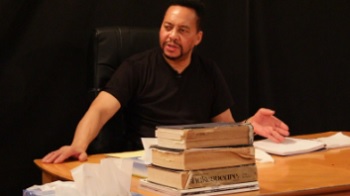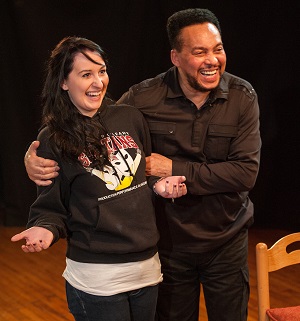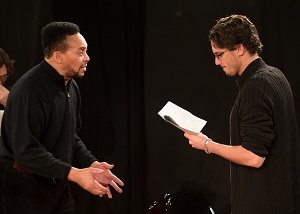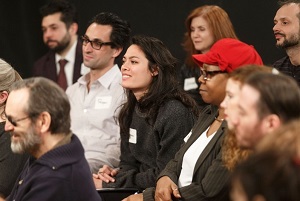
When approaching the study of drama, you must start from a foundation of truth. The first step is to check out your belief system. Why do you want to study acting? What do you want to achieve? All human beings long to know if they can make an impact in life. Our greatest desire is to contribute something, because in doing so, we give a unique, lasting and eternal part of ourselves to the world.
In order to make a contribution, you have to be disciplined, and develop a vision and way of thinking and living that is truthful – – not only on the stage, but in your life. The reason you must learn to live truthfully is because the time that you spend in your life far exceeds the time you are on stage. If you practice truth in life, it will be reflected on the stage and your talent will grow.
You build this vision and way of living by using Acting Technique. Acting Technique is like a house for your talent. It creates security and allows you to express your talent in the world with confidence. Simply put, technique allows you to know what you are doing.

The first step in my technique is to free the instrument to express emotional truth and open up the imagination. The exercises I teach to free the instrument include sensory work, movement in the imagination and emotional work. Once you’ve done these exercises, the instrument is in tune and in a creative state. You will learn to live truthfully in an imaginary environment and have truthful, emotional responses to imaginary circumstances. You will never have to force or contrive emotions – – you will simply respond to the imaginary circumstances that you have created. This gives the actor great power, freedom, security and an unending well of inspiration.
Then you will learn about choice. You will learn to make choices that warm and evoke a passionate response in you, choices that move you and ultimately move your audience. Many actors make dull, boring, dead choices, either because they were taught incorrectly or they are unwilling to commit to action in life. If you don’t commit to action in life, you will be passive. This passivity creates a dead actor and the audience is left uninspired, unmoved and probably angry because the actor did not live up to his or her promise and did not make choices to fulfill the intentions of the play. This is why you hear the traditional, age-old adage “Within the choice lies the talent.”

Actions are the building blocks of acting, and you will learn what an action is and how to do an action. What does it take to do something? What are the specific steps? The work of the actor is to discover what these steps are. Actions are born within us. We must understand that life is action and sequence. You will learn you cannot play an overall action – – but you can play the steps that make up the overall action. For example, you cannot play Christmas or Hanukkah. For Christmas you can give presents and decorate the Christmas tree to represent Christmas. For Hanukkah you light candles and exchange gifts. The microcosm of these small steps make up the whole, but you can never play an overall action.
Action is doing. As you do the steps of the action, your imagination will be alive and your emotion will flow out within the steps and sequences. When you see acting in terms of simple doing, feeling and imagining, then we take the mystery away from it – – we can understand it in our simple, everyday behavior. We start with simple actions like observing a squirrel in the park or writing a letter. We then move on to more complex actions like the actions “to argue” or “to discover”. You will then learn to justify those actions. You learn to make a choice as to why you did this or that action. Those choices or justifications take on different shades whereby you will learn to create justifications that are light, medium, or dark.
This will lead you to be able to build more complex psycho-physical actions where the psychological nuances of a character are revealed in simple physical action. The psycho-physical action represents you expressing the complex way you feel in the way you physicalize the action. The psycho-physical actions brings together emotions, intellect and physicality – – and you as the actor express yourself emotionally and physically in the specific, particular way that the character you are playing would do in that particular situation. This creates a very exciting, explosive and complex dramatic expression of theatre in that moment. This moment is a classical, legendary, hallmark expression of traditional, contemporary, dramatic classical drama.

This brings us to Character Development. You will gain a deep understanding of the nature of a character, meaning, what is the character’s essence, and what is his or her inner and outer life? You will understand intimately how that character would act in any given situation. Having gained that understanding, you may decide to make an unusual choice that goes against what that character would normally do. That represents a complex choice that you made to be out of character. Having all of these tools allows the actor to begin to create characters of depth and complexity. Here you begin to make a series of choices that reveal the many layers and levels that influence how the character does his or her actions. Through the course of a rehearsal process, these actions and steps within the actions are knitted together to create a performance of power, deep complexity and believability.
Script Analysis or breakdown is about understanding. By studying the scripts of the great dramatists, the actor learns to understand the world and how it operates on a universal level. You understand how each image and character in the play represents major archetypes and big, universal ideas, such as the idealist, the realist, the pragmatist and the philistine. These archetypes and big ideas help us understand our world and how we fit into the world as individuals and as a community. We learn that the actor needs to stand outside society to ultimately interpret and give understanding and insight to what is going on in society so that it can grow and change.
I teach Technique, Character Development and Script Analysis to prepare the actor to work on scenes. In Scene Study you apply in a practical, hands-on way all of the elements you have just examined and experienced. You put them to work for you as you read your script and rehearse your scene. There is no better way to learn. The work you do in scene study prepares you to create and rehearse a performance piece that you present in a showcase of directed work for an audience of the general public. By immediately applying what you have learned in Scene Study, you stretch your capacity to achieve a breakthrough performance that leaves a lasting impression on the world.

In the Master Class, I teach all of the elements of the actor’s craft in one class. Together we will examine and explore each issue. I will present each element of the actor’s craft and you will immediately put it into action in order to see the practical application of the concept at work. You will get the whys and the hows of the actor’s craft. You will get the ultimate actor’s toolbox that you will be able to pull out when you are developing a character for a play or film. It is a very practical class that will yield extraordinary results.
This is a class that you can come back to again and again to further deepen your craft. As I said, I want a class with everything in it for actors at all levels so they can learn from each other and relearn what it takes to act. In this class, you will be given all of the information: the secrets of acting and the tools to unlock those secrets and live in the mysteries that will unfold in your quest and magnificent journey as an artist.
This is excerpted from Mr. Scott’s essay, Digging for Gold. Please read more about Mr. Scott’s technique and the unique creative relationship that he builds with his students.
